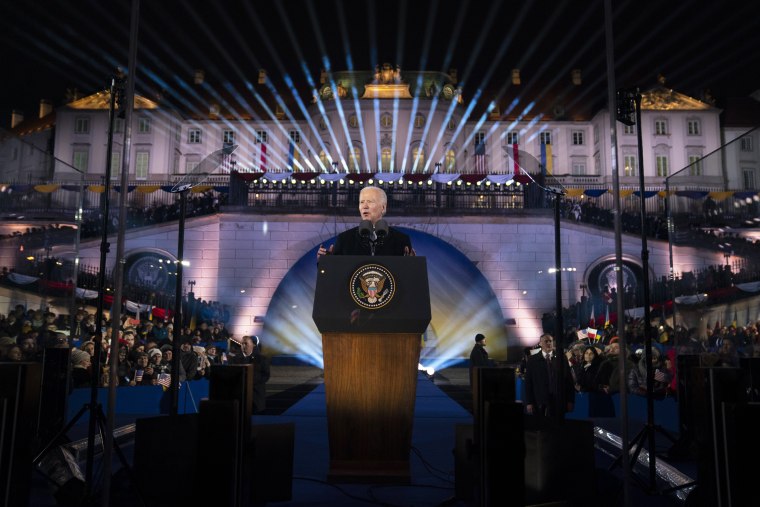WASHINGTON — President Joe Biden echoed his 2020 campaign and alluded to his all-but-certain re-election bid in Poland on Tuesday, as he lauded the democracies of the world for coming to Ukraine's defense against Russia's year-old invasion.
"The decisions we make over the next five years or so are going to determine and shape our lives for decades to come," said Biden, who would be nearing the end of a second term at the end of that time frame. "The choice between chaos and stability, between building and destroying, between hope and fear, between democracy, [which] lifts up the human spirit, and the brutal hand of the dictator who crushes it."
At his 2020 Democratic convention acceptance speech, Biden accused then-President Donald Trump of having "cloaked America in darkness" and vowed to be "an ally of the light, not of the darkness." On Tuesday, Biden called on the free world to make "an abiding commitment to be allies — not of darkness, but of light."
The references served to connect his role as leader of the free world to one of his major campaign themes of the past and the future.
Warsaw, Poland, is an odd backdrop for an American president to launch his re-election campaign — and Biden did not do that — but, as he gears up to run again, Biden emphasized the parallel he draws between domestic political fights and his view of a global battle pitting freedom against tyranny.
In that way, his argument for continued American engagement in Ukraine is part of a larger case that both his own country and the world must choose now between authoritarianism and democracy — a case that includes as exhibits Trump's efforts to overturn the 2020 election and the insurrection at the Capitol.
Some Republicans have criticized Biden's trip to Europe — one set because they say he is more interested in defending Ukraine's borders than America's, and another set because he hasn't visited the site of a train derailment in East Palestine, Ohio.
House Speaker Kevin McCarthy, R-Calif., and Florida Gov. Ron DeSantis, who is widely expected to run for the Republican presidential nomination, have said Biden should not have a "blank check" in providing aid to Ukraine.
But despite some misgivings in both parties — public support for Congress approving more money was split 49% to 47% in an NBC News poll last month — Washington has kept pumping money into the effort.
More important for Biden's politics, the issue has badly divided Republicans. In a January Pew Research Center survey, 40% of Republicans said the U.S. is giving too much money to Ukraine, compared to 15% of Democrats who said the same.
Biden on Tuesday noted the critical role of unity in a fight, referring to "Solidarity," the Polish union that helped bring about the end of the Russia-style communist regime in Poland in the late 1980s.
"Knowing who stands with you makes all the difference," Biden said. "The people in Poland know that, you know that. In fact, you know, you know it better than anyone here in Poland, because that’s what Solidarity means."
Aside from public approval of the U.S. role in the war, Biden appeared eager to show through the war in Ukraine — standing up to Russian President Vladimir Putin — his strength as a leader on the world stage. At a time when rivals are calling for mental competency tests for candidates his age — South Carolina's Nikki Haley and Trump have done so — and Republicans frequently accuse him of weakness, public perception of Biden's fortitude could be an important factor in the 2024 election.
He said that when Russia invaded Ukraine, there was a question of whether the democracies of the world would stand strong to stop Putin.
"One year later, we know the answer," Biden said, positioning himself at the forefront of the global response. "We did respond, we would be strong, we would be united, and the world would not look the other way."

